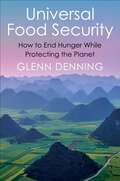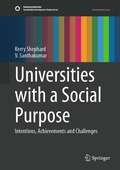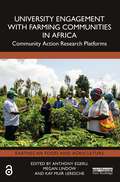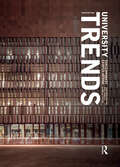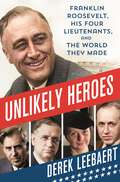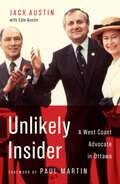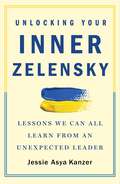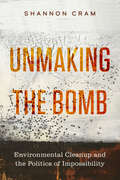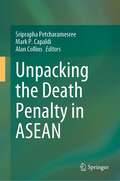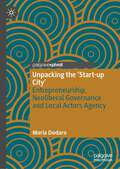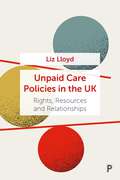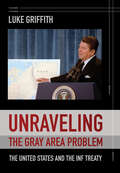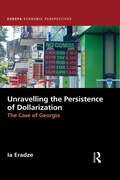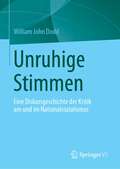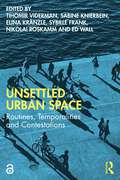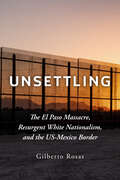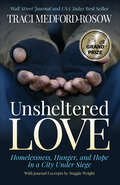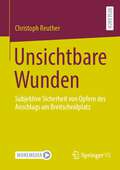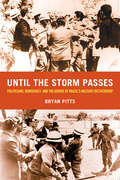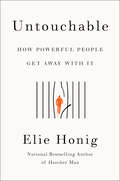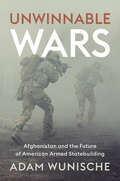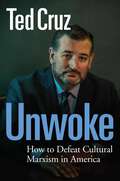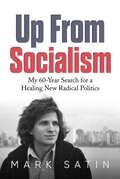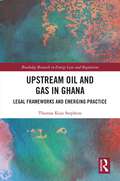- Table View
- List View
Universal Food Security: How to End Hunger While Protecting the Planet
by Glenn DenningWhat would it take to achieve a genuinely food-secure world—one without hunger or malnutrition, where everyone gets to consume the right quantity and quality of food to live a healthy, active, and productive life? Bringing about such a future requires transforming how our food is grown, managed, and distributed. From production to consumption, food systems must be sustainable, halting environmental degradation and even repairing the damage we have previously done.This book provides an accessible guide to making healthy diets from sustainable food systems available to all. Glenn Denning bridges the divisive worlds of science, policy, and practice. He synthesizes the most relevant literature and shares personal perspectives and insights gained over four decades working in more than fifty countries, coupled with the real-world experience of hundreds of leading experts. Universal Food Security lays out key priorities—sustainable intensification, market infrastructure, postharvest stewardship, healthy diets, and social protection—and presents how to achieve food systems transformation.Denning identifies the education and development of practitioner-leaders as the critical trigger of change. Universal Food Security informs and inspires those leaders—acting on their own and with others through institutions—to achieve a food-secure world. This book is an ideal handbook for students and practitioners looking to transform our food systems at all levels.
Universities with a Social Purpose: Intentions, Achievements and Challenges (Sustainable Development Goals Series)
by V. Santhakumar Kerry ShephardThis book is a narrative of conversations between two professors, with different backgrounds, academic disciplines, life experiences, and from different continents. It shows how their discourse has brought them to a single destination defined by a mutual interest in the social purposes of universities, and a hope in common that their academic efforts will somehow do good in the world. The seventeen internationally-agreed Sustainable Development Goals (SDGs) provide focus for aspirations and plans regarding sustainability, but notably, the SDGs’ targets and indicators rarely provide detailed accounts of who is expected to enact change. This book addresses the role of higher education in this context and explores the social purposes of universities and their relation to the Sustainable Development Goals. It presents an academic analysis of this complex situation, based on insights from published literature on higher education, and the personal but very different experiences of two professors with this shared interest.
University Engagement with Farming Communities in Africa: Community Action Research Platforms (Earthscan Food and Agriculture)
by Anthony EgeruThis book explains and explores how collaborations can be built and strengthened between African universities and farming communities to address real-world contemporary challenges. The book focuses on Community Action Research Platforms, an approach that has successfully enabled African universities to break free of the ivory tower and prove their relevance to society through deep collaborative engagements in targeted agricultural value chains. Developed in a pan-African network of universities (RUFORUM) focused on capacity building in agriculture, the approach has been tested in diverse settings over the last 15 years. The book draws on the experiences and lessons from 21 different projects initiated by RUFORUM member universities in Benin, Botswana, Ethiopia, Ghana, Kenya, Malawi, Namibia, South Africa, Sudan, Tanzania, Uganda and Zimbabwe. It highlights a critical yet underutilised role for African universities as collaborators and catalysts for multisector solutions. These are solutions that increase productivity and address climate change. They develop livelihoods and resilience in rural communities, as well as promote farmers’ access to markets, innovation and trade while safeguarding biodiversity and enhancing food and nutrition security. The book makes a case for repositioning African universities as fulcrums of development in society. It shares the rich experiences, learnings and scientific findings of diverse researchers, practitioners and students who have been working towards achieving this reality on the ground. This multidisciplinary book holds appeal for university leaders, higher education, agrifood and development specialists, researchers and practitioners, policymakers and development agencies engaged in African agriculture and rural development, higher education and sustainable growth.
University Trends: Contemporary Campus Design
by Paul Roberts Jonathan Coulson Isabelle TaylorThe campus has a deep-rooted prestige as a place of teaching, learning and nurturing. Conjuring images of cloistered quadrangles, of sunny lawns, of wood-panelled libraries, it is a word viscerally charged with centuries of scholarly tradition. And yet it is also a place of cutting-edge science, vibrancy and energy. It is this dual nature, this concurrent adherence to tradition and innovation, which renders the physical environment of the university such a redolent, enduring and dynamic realm. However, it also means that the twenty-first-century campus is a highly challenging and exacting landscape to design and manage successfully. Today, the scale of the pressures and the rate of change facing higher education institutions are greater than ever. Squeezed public spending, growing societal expectations and the broadening education ambitions of developing nations are set against a backdrop of rapid technological progress and changing pedagogies. What are the repercussions for the physical realities of university planning and architecture? And how are university campuses adapting to contend with these pressures? University Trends: Contemporary Campus Design introduces the most significant, widespread, and thought-provoking trends that are currently shaping the planning and architecture of higher education institutions across the world. Within this completely revised third edition, Part One identifies current patterns such as student hubs, large-scale expansions and buildings for innovation and interdisciplinary research. Part Two profiles these through recent, well-illustrated, global case studies. This is the essential guide to current and future trends in campus design.
Unlikely Heroes: Franklin Roosevelt, His Four Lieutenants, and the World They Made
by Derek Leebaert"Propulsive." —The Wall Street Journal“Leebaert has done the near impossible—crafted a fresh and challenging portrait of the man and his inner circle.”— Richard Norton Smith, author of An Uncommon Man, former director of the Hoover, Eisenhower, Reagan, and Ford presidential libraries.“A fascinating and absorbing analysis of FDR’s brilliantly chosen team of four courageous and creative men and women.”—Susan Dunn, author of 1940: FDR, Willkie, Lindbergh, Hitler—the Election Amid the Storm, Massachusetts Professor of Humanities, Williams College.Drawing on new materials, Unlikely Heroes constructs an entirely fresh understanding of FDR and his presidency by spotlighting the powerful, equally wounded figures whom he raised up to confront the Depression, then to beat the Axis.Only four people served at the top echelon of President Franklin Roosevelt's Administration from the frightening early months of spring 1933 until he died in April 1945, on the cusp of wartime victory. These lieutenants composed the tough, constrictive, long-term core of government. They built the great institutions being raised against the Depression, implemented the New Deal, and they were pivotal to winning World War II.Yet, in their different ways, each was as wounded as the polio-stricken titan. Harry Hopkins, Harold Ickes, Frances Perkins, and Henry Wallace were also strange outsiders. Up to 1933, none would ever have been considered for high office. Still, each became a world figure, and it would have been exceedingly difficult for Roosevelt to transform the nation without them. By examining the lives of these four, a very different picture emerges of how Americans saved their democracy and rescued civilization overseas. Many of the dangers that they all overcame are troublingly like those America faces today.
Unlikely Insider: A West Coast Advocate in Ottawa
by Jack AustinAt a time when too many of the world’s political leaders are consolidating power by playing on divisions and stoking fear, Unlikely Insider, a memoir by former federal cabinet minister and senator Jack Austin, comes as a welcome reminder of the value of public service as a force for economic progress, social justice, and nation-building.With both historical perspective and an eye to the future, Austin reflects on events and people whose impacts are still felt, and on the enduring challenges of Canadian life. Moving away from colonial domination of Indigenous Peoples, navigating our pivotal relationship with the United States and engagement with China, the nature and purpose of the Senate: these remain timely concerns, to which Austin has made significant contributions. Sharing insights into policy as well as into the personalities of colleagues and friends, Unlikely Insider paints vignettes of figures from Premier Zhou Enlai to Queen Elizabeth and recounts the author’s travels with Pierre Trudeau after the prime minister’s retirement. As a British Columbian, Austin worked to ensure that his province’s perspectives and interests mattered in Ottawa; as someone who came from a disadvantaged background, he is sensitive to the need to make the country a place of fairness and opportunity for all. Unlikely Insider reminds Canadians that inclusion – regional, social, and demographic – makes our nation both stronger and more just.
Unlocking PhD Success: How to Acquire Crucial PhD Skills
by Eelko K.R.E. HuizinghAre you a current or aspiring Ph.D. student determined to overcome the challenges that lie ahead? Do not let statistics discourage you, because this comprehensive guide is here to help you defy the odds and reach the pinnacle of academic achievement. With failure rates hovering between 40% and 50%, it is crucial to equip yourself with the right skills to ensure your success. In this book, you will embark on a transformative journey toward becoming a confident and accomplished scholar. This book takes a meticulous approach, addressing the six essential skills every Ph.D. student must possess: research, writing, presentation, time management, persistence, and collaboration. Each chapter delves into the significance of these skills within the Ph.D. process, explores the necessary competences, and provides practical strategies for their acquisition. Armed with numerous tips, tricks, and actionable advice, this invaluable resource empowers you to optimize your performance throughout your Ph.D. journey. Within these pages, you will discover how to assess your current skill set, identify areas for improvement, and develop a personalized academic development plan. With the aid of many informative figures and tables, you will find quick and easy access to expert guidance. Do not let uncertainty and self-doubt hinder your progress. “Unlocking PhD Success” is your roadmap to triumph, supporting you every step of the way as you conquer the challenges of doctoral studies. Embrace this book as your trusted companion, and unlock your full potential as an exceptional Ph.D. candidate.
Unlocking Your Inner Zelensky: Lessons We Can All Learn from an Unexpected Leader
by Jessie Asya KanzerVolodymyr Zelensky captivated the world when his country was invaded by Russia in February 2022. His appearances were accompanied by countless inspiring statements. But there's a single one that informs Unlocking Your Inner Zelensky: "We are all simple people."Jessie Kanzer sees Zelensky as a Spiritual Leader for Our Times. As a Soviet refugee, she picks up on the deep philosophical ramifications behind his words. Rich and yet easy-to-read, the life lessons in Unlocking Your Inner Zelensky are accessible and wise, and are more about starting where you are than about war.Kanzer herself has a bit part in Zelensky's life story, acting in one of his movies filmed in the States. She's a self-described "spiritual nerd" who followed Zelensky long before he stood before a blue and yellow backdrop on the national stage. She writes, "What is so incredible about our man Volodymyr is that his belief in himself stems not from seeing himself as special, but from seeing himself as ordinary and from knowing there is great power in this ordinariness."
Unmaking the Bomb: Environmental Cleanup and the Politics of Impossibility (Critical Environments: Nature, Science, and Politics #14)
by Shannon CramWhat does it mean to reckon with a contaminated world? In Unmaking the Bomb, Shannon Cram considers the complex social politics of this question and the regulatory infrastructures designed to answer it. Blending history, ethnography, and memoir, she investigates remediation efforts at the Hanford Nuclear Reservation, a former weapons complex in Washington State. Home to the majority of the nation's high-level nuclear waste and its largest environmental cleanup, Hanford is tasked with managing toxic materials that will long outlast the United States and its institutional capacities. Cram examines the embodied uncertainties and structural impossibilities integral to that endeavor. In particular, this lyrical book engages in a kind of narrative contamination, toggling back and forth between cleanup's administrative frames and the stories that overspill them. It spends time with the statistical people that inhabit cleanup's metrics and models and the nonstatistical people that live with their effects. And, in the process, it explores the uneven social relations that make toxicity a normative condition.
Unpacking the Death Penalty in ASEAN
by Alan Collins Sriprapha Petcharamesree Mark P. CapaldiThis book contributes conceptually, theoretically and morally to a deeper understanding of the distinctive Asian perceptions of punishment, justice and human rights. Researched and prepared by scholars who have not only been conducting studies on the death penalty in the region but have also been advocating for legal reforms, this edited book touches upon the different justifications for the use of capital punishment in the ASEAN region, exposing the secrecy, sensitivities and dilemmas that mask violations of international human rights laws. The chapters bring in numerous new perspectives which have been overlooked in the traditional discourse surrounding the use of the death penalty, such as that around crimes that do not meet the threshold of “most serious”; the dignity of death row inmates and their families; contradictions within religion and capital punishment; and the way in which growing authoritarianism and the media are adversely influencing the public’s perception and support for capital punishment in the region. In examining how public opinion shapes state policies towards the death penalty and how it varies according to different offences and different states, the authors critically analyse how the international human rights mechanisms have specifically called for ASEAN member states to refrain from extending the application of the death penalty and to limit it to the “most serious crimes.” Relevant to socio-legal scholars focused on crime and punishment in Southeast Asia, and in the Global South more broadly, this is a landmark collection in criminology and human rights scholarship. Chapter "ASEAN and the Death Penalty: Theoretical and Legal Views and a Pathway to Abolition" is available open access under a Creative Commons Attribution 4.0 International License via link.springer.com.
Unpacking the ‘Start-up City’: Entrepreneurship, Neoliberal Governance and Local Actors Agency
by Maria DodaroThis book provides an invaluable overview of neoliberalising trends in urban policies and governance by presenting novel perspectives on municipal entrepreneurship support policies. It seeks to address a current lack of in-depth empirical knowledge of this topic and the reference literature’s silence on local actors agency. The book ’s scholarly debate around the impact of neoliberal capitalism on cities interweaves with empirical observations in the European cities of Barcelona and Milan with a view to examining what lies behind the “start-up city” label, and the way local actors reproduce, contest and re-signify entrepreneurship policies and practices in a highly individualised context. Based on more than sixty interviews with key policy actors, including young beneficiaries, it sheds light on their representations, motivations, intentions and room for manoeuvre in a way that encompasses local specificities in which multi-scalar economic, social, institutional and cultural processes interact. Finally, this book offers new insights into critical entrepreneurship studies and current debates about convergence and divergence trends in urban policies and governance.
Unpaid Care Policies in the UK: Rights, Resources and Relationships
by Liz LloydThis book examines policies on unpaid care throughout the UK since the 1990 NHS and Community Care Act. It questions why, after decades of policies and strategies, unpaid care remains in a marginal position in the social care system and in society more broadly, as demonstrated during the COVID-19 pandemic. It provides critical analysis of key policies and professional practice over three decades and highlights the continuing challenges faced by people in caring relationships, as well as reflecting on developments in the position of unpaid carers in the system of social care. By questioning why this crucially important sphere of human life remains under-resourced, it sheds light on the ways in which care is understood and how policy makers and service providers perceive the need for support.
Unraveling the Gray Area Problem: The United States and the INF Treaty
by Luke GriffithIn Unraveling the Gray Area Problem, Luke Griffith examines the US role in why the Intermediate-Range Nuclear Forces (INF) Treaty took almost a decade to negotiate and then failed in just thirty years. The INF Treaty enhanced Western security by prohibiting US and Russian ground-based missiles with maximum ranges of 500 to 5,500 kilometers. Significantly, it eliminated hundreds of Soviet SS-20 missiles, which could annihilate targets throughout Eurasia in minutes. Through close scrutiny of US theater nuclear policy from 1977 to 1987, Griffith describes the Carter administration's masterminding of the dual-track decision of December 1979, the North Atlantic Treaty Organization (NATO) initiative that led to the INF Treaty. The Reagan administration, in turn, overcame bureaucratic infighting, Soviet intransigence, and political obstacles at home and abroad to achieve a satisfactory outcome in the INF negotiations. Disagreements between the US and Russia undermined the INF Treaty and led to its dissolution in 2019. Meanwhile, the US is developing a new generation of ground-based, INF-type missiles that will have an operational value on the battlefield. Griffith urges policymakers to consider the utility of INF-type missiles in new arms control negotiations. Understanding the scope and consistency of US arms control policy across the Carter and Reagan administrations offers important lessons for policymakers in the twenty-first century.
Unravelling The Persistence of Dollarization: The Case of Georgia (Europa Economic Perspectives)
by Ia EradzeThis volume engages with the roots, dimensions, and implications of foreign currency domination in states with a national currency. Referred to as unofficial dollarization in literature, this is a worldwide phenomenon among developing countries and has a long history. This monograph provides a political economic analysis of dollarization in Georgia and is structured around three themes: the genesis of dollarization (1991–2003), the persistence of dollarization (2003–12) and the politicization of dollarization (2012–19). The case of Georgia is especially representative of the post-socialist transition states, but also has wider applicability. A high level of dollarization is a significant barrier to economic growth, macroeconomic and political stability, functional monetary policy, as well as social welfare. The Covid-19 crisis and the increasing debt of developing countries in foreign currency exacerbate dollarization-related vulnerabilities for these economies. This book will be of interest to postgraduate students in global/comparative political economy, development economics or transition economies, researchers in monetary sovereignty, central banking, exchange rate policies, currency hierarchy, money, financialization, and policy makers in dollarized countries and global institutions.
Unruhige Stimmen: Eine Diskursgeschichte der Kritik am und im Nationalsozialismus
by William John DoddIn dieser Diskursgeschichte analysiert W. J. Dodd die "unruhigen Stimmen" von Gegnern, deren zeitgenössische Kritik am Nationalsozialismus sich aus Positionen des territorialen und inneren Exils auf die "Sprache des Nationalsozialismus" konzentrierte. Die einzelnen Kapitel befassen sich mit den "Vorläufer"-Diskursen, dem öffentlichen Diskurs der Nazis von 1933 bis 1945, den Zeugnissen der "unruhigen Stimmen" im Ausland sowie in privaten und veröffentlichten Texten im "Reich", den Versuchen zur "Entnazifizierung der Sprache" (1945-49) und den Hinterlassenschaften der Nazi-Vergangenheit in einem retrospektiven Diskurs der "Aufarbeitung" der Nazi-Vergangenheit. In der Zeit nach 1945 konzentriert sich das Buch auf die Anfechtung der "befleckten Sprache" und die Instrumentalisierung der NS-Vergangenheit sowie auf das Fortbestehen sprachlicher Tabus im zeitgenössischen deutschen Sprachgebrauch. Das Buch, das durchgehend in englischer Übersetzung vorliegt, ist eine unschätzbare Quelle für Wissenschaftler der Diskursanalyse, der Soziolinguistik und der deutschen Geschichte und Kultur sowie für Leser mit einem allgemeinen Interesse an Sprache und Politik.
Unsettled Urban Space: Routines, Temporalities and Contestations
by Sabine Knierbein Ed Wall Tihomir Viderman Sybille Frank Nikolai Roskamm Elina KränzleWhile urban life can be characterized by endeavors to settle stable and safe environments, for many people, urban space is rarely stable or safe; it is uncertain, troubled, imbued with challenges and perpetually under pressure. As the concept of unsettled appears to define the contemporary urban experience, this multidisciplinary book investigates the conflicts and possibilities of settling and unsettling through open and speculative analysis. The analytical prism of unsettled renders urban space an indeterminate ground unfolding through routines, temporalities and contestations in constant tension between settling and unsettling. Such contrasting experiences are contingent on how urban societies confront, undergo and overcome turbulence and difficulties in time and space. Contributions drawing on theoretical reflections and empirical accounts—from Argentina, Austria, Germany, Greece, Italy, the Netherlands, the UAE, the UK, the USA and Vietnam—give insights into plural occurrences of the unsettled, which might tie down or unleash transformative, liberatory and emancipatory potentials. This book is for students, professionals and researchers interested in the uncertainties, foundations, disturbances, inconsistencies, residuals and blind fields, which constitute the urban both as lived space and as social, cultural and political ideal.
Unsettling: The El Paso Massacre, Resurgent White Nationalism, and the US-Mexico Border
by Gilberto RosasDocuments the cruel immigration policies and treatment toward border crossers on the US-Mexico border.On August 3, 2019, a far-right extremist committed a deadly mass shooting at a major shopping center in El Paso, Texas, a city on the border of the United States and Mexico. In Unsettling, Gilberto Rosas situates this devastating shooting as the latest unsettling consequence of our border crisis and currents of deeply rooted white nationalism embedded in the United States. Tracing strict immigration policies and inhumane border treatment from the Clinton era through Democratic and Republican administrations alike, Rosas shows how the rhetoric around these policies helped lead to the Trump administration's brutal crackdown on migration—and the massacre in El Paso. Rosas draws on poignant stories and compelling testimonies from workers in immigrant justice organizations, federal public defenders, immigration attorneys, and human rights activists to document the cruelties and indignities inflicted on border crossers. Borders, as sites of crossings and spaces long inhabited by marginalized populations, generate deep anxiety across much of the contemporary world. Rosas demonstrates how the Trump administration amplified and weaponized immigration and border policy, including family separation, torture, and murder. None of this dehumanization and violence was inevitable, however. The border zone in El Paso (which translates to "the Pass") was once a very different place, one marked by frequent and inconsequential crossings to and from both sides—and with more humane immigration policies, it could become that once again.
Unsheltered Love: Homelessness, Hunger and Hope in a City Under Siege
by Traci Medford-RosowUnsheltered Love provides a first-hand reported account of how the homeless in New York City survived the pandemic.
Unsichtbare Wunden: Subjektive Sicherheit von Opfern des Anschlags am Breitscheidplatz
by Christoph ReutherSpätestens seit den Anschlägen am 11. September 2001 ist der islamistische Terrorismus in westlichen Ländern angekommen, so auch in Deutschland. Der Angriff am Breitscheidplatz in Berlin hinterließ neben 13 Toten eine Vielzahl von Verletzten, die teils Jahre später noch unter den Folgen leiden, darunter Panikattacken und Flashbacks. Wie geht es diesen Menschen heute? Leiden sie weiterhin unter den psychischen Folgen? Wie beurteilen sie die staatlichen Reaktionen auf den Angriff? Die Untersuchung greift jene Fragen auf und nimmt mit dem Blick auf die subjektive Sicherheit eine Opferperspektive ein.
Until the Storm Passes: Politicians, Democracy, and the Demise of Brazil’s Military Dictatorship
by Bryan PittsA free open access ebook is available upon publication. Learn more at www.luminosoa.org.Until the Storm Passes reveals how Brazil's 1964–1985 military dictatorship contributed to its own demise by alienating the civilian political elites who initially helped bring it to power. Based on exhaustive research conducted in nearly twenty archives in five countries, as well as on oral histories with surviving politicians from the period, this book tells the surprising story of how the alternatingly self-interested and heroic resistance of the political class contributed decisively to Brazil's democratization. As they gradually turned against military rule, politicians began to embrace a political role for the masses that most of them would never have accepted in 1964, thus setting the stage for the breathtaking expansion of democracy that Brazil enjoyed over the next three decades.
Untouchable: How Powerful People Get Away with It
by Elie HonigA NEXT BIG IDEA CLUB 'MUST-READ'CNN senior legal analyst and nationally bestselling author Elie Honig explores America’s two-tier justice system, explaining how the rich, the famous, and the powerful— including, most notoriously, Donald Trump—manipulate the legal system to escape justice and get away with vast misdeeds.How does he get away with it? That question, more than any other, vexes observers of and participants in the American criminal justice process. How do powerful people weaponize their wealth, political power, and fame to beat the system? And how can prosecutors fight back?In Untouchable, Elie Honig exposes how the rich and powerful use the system to their own benefit, revealing how notorious figures like Donald Trump, Jeffrey Epstein, Harvey Weinstein, and Bill Cosby successfully eluded justice for decades. He demonstrates how the Trump children dodged a fraud indictment. He makes clear how countless CEOs and titans of Wall Street have been let off the hook, receiving financial penalties without suffering criminal consequences. This doesn’t happen by accident.Over the four years of his administration, Donald Trump’s corruption seemed plain for all to see. The former president obstructed justice, flouted his responsibility to the Constitution, lied to the American people, and set the United States on a dark path to disunity and violence. Yet he has never been held accountable for any of his misdeeds. Why not?Untouchable holds the answer. Honig shows how Trump and others use seemingly fair institutions and practices to build empires of corruption and get away with misdeeds for which ordinary people would be sentenced to years behind bars. It’s not just that money talks, Honig makes clear, but how it can corrupt otherwise reliable institutions and blind people to the real power dynamics behind the scenes.In this vital, incisive book, Honig explains how the system allows the powerful to become untouchable, takes us inside their heads, and offers solutions for making the system more honest and fairer, ensuring true justice for all—holding everyone, no matter their status, accountable for their criminal misdeeds.
Unwinnable Wars: Afghanistan and the Future of American Armed Statebuilding
by Adam WunischeIn nine short days, Taliban forces destroyed two decades of American armed statebuilding in Afghanistan. This was no isolated failure. Over the last century, almost every attempt to intervene militarily to prop up or reconstruct an allied state has seen similar dismal outcomes. Why? This book answers that fundamental question. By exploring the factors that hindered success in Afghanistan, Adam Wunische identifies forces common to other unsuccessful U.S. armed statebuilding missions, from Vietnam to Syria, Haiti to Iraq. These forces, he argues, inherently favor insurgencies, forfeit sustainability for quick results, and create dependencies and corruption – all of which undermine the goal of building a state that can stand on its own. Not only that, but most of these forces are inescapable and uncontrollable. This means any future attempts at armed statebuilding will likely also be unwinnable, with costs and consequences far outpacing America’s interests and benefits. Faced with a future likely dominated by proxy wars, Wunische offers a novel way forward to prevent the U.S. from chasing new wars that it is destined to lose.
Unwoke: How to Defeat Cultural Marxism in America
by Ted CruzOur institutions have gone "woke." Everybody knows that. But nobody has come up with a way to stop it. Until now. <p><p> In this hard-hitting new book, Senator Ted Cruz delivers a realistic battle plan for defeating the woke assault on America. <p><p> The Democratic Party is now controlled by Cultural Marxists. So are our universities and public schools, the media, Big Tech, and Big Business. Corporations push transgenderism down their customers' throats. Banks punish gun shops. Hollywood insults our religious beliefs and grooms our children. The big investment companies use our retirement savings to promote leftist causes. And the Biden administration has turned our military into an indoctrination camp, neglected transportation safety to focus on climate change, and persecuted peaceful pro-lifers while leaving prochoice arsonists at large. <p><p> The son of Cuban immigrants who fled communist oppression, Cruz is uniquely equipped to fight the woke revolution. He eloquently explains how Cultural Marxism got a foothold in America, how it progressed, and how, in precise steps, we can fight back to regain our institutions, regain our country—and win the future for our children. <p><p> Bold, practical, and necessary, Unwoke is the book we need to restore the America we love. <p> <b>New York Times Bestseller</b>
Up From Socialism: My 60-Year Search for a Healing New Radical Politics
by Mark SatinAn essential introduction to the visionary, beyond-left-and-right political activism of the last 60 years, and a deeply honest insider account of why those activists have—so far—fallen short.&“I appreciate that Satin is willing to be so candid. It helps us all learn. And he writes in a way that touches the soul.&” —Christa Slaton, First platform coordinator for the U.S. Green Party movement, and co-editor of the book Transformational Politics: Theory, Study, and Practice In a gripping first-person narrative that reads like a novel, using his own experiences as a lens, Mark Satin tells the story of three generations of thinkers and activists who tried—and are still trying—to create a post-socialist, post-conservative, visionary and healing new politics for the U.S. In this book, Satin shows that the increasingly militant movements of the Sixties drove many young people away—and into a search for a political system and world that could work for everyone. He looks at initiatives and organizations that over the next 30 years tried to further that search, such as the New World Alliance and the early U.S. Green Party movement. Then he illuminates the 21st century turn to &“radical centrist&” and &“transpartisan&” political initiatives. Each chapter begins with a brief, context-setting introduction. Throughout the book are intense, blow-by-blow accounts of organization- and movement-building, as well as brief glimpses at over 40 often underappreciated visionary books. And always there are deeply honest accounts of Satin&’s and other activists&’ often shaky relationships with colleagues, family, and lovers—because getting healing politics right cannot be divorced from getting personal and interpersonal behavior right. You will enjoy watching Satin&’s encounters with civil rights militant Hardy Frye, Weather Underground terrorist Mark Rudd, environmental activist Paul Hawken, &“beyond GNP&” economic thinker Hazel Henderson, futurists John Naisbitt and Alvin Toffler, Nobel Peace Prize nominee Gene Sharp, Aquarian Conspiracy author Marilyn Ferguson, critical race theory co-creator Derrick Bell, radical centrist author John Avlon, and more. Nobody, least of all Satin, comes across as all-wise here, and long before this subtle and courageous book ends you will realize that a truly visionary and healing politics can only be built if we&’re willing to address all the behavioral, intellectual, organizational, and attitudinal issues this book raises.
Upstream Oil and Gas in Ghana: Legal Frameworks and Emerging Practice (Routledge Research in Energy Law and Regulation)
by Thomas Kojo StephensThis book explores the myriad issues that play out in the upstream petroleum industry of Ghana from a legal perspective. Focusing on Ghana as an emerging petroleum country, Thomas Kojo Stephens begins by examining whether the existing constitutional framework will be effective in governing the expanding oil and gas sector. Drawing on various approaches proffered by other experts in the field, Stephens looks at possible institutional structures that could be put in place and juxtaposes these ideas with the experience of Ghana to test the efficacy of these proposals. He also explores the types of contractual frameworks currently implemented in Ghana for comparison with other emerging petroleum economies, examining the barriers to effectiveness, novel provisions that must be incorporated, and lessons learned from other regions. Finally, the book highlights how vital it is for the Ghanaian State to monitor the use of petroleum revenue and make ethical investment decisions that prioritize the interests of Ghanaian citizens. Upstream Oil and Gas in Ghana will be of great interest to students and scholars of energy law and policy, oil and gas management, and African Studies more broadly, as well as those working in the upstream petroleum industry.
